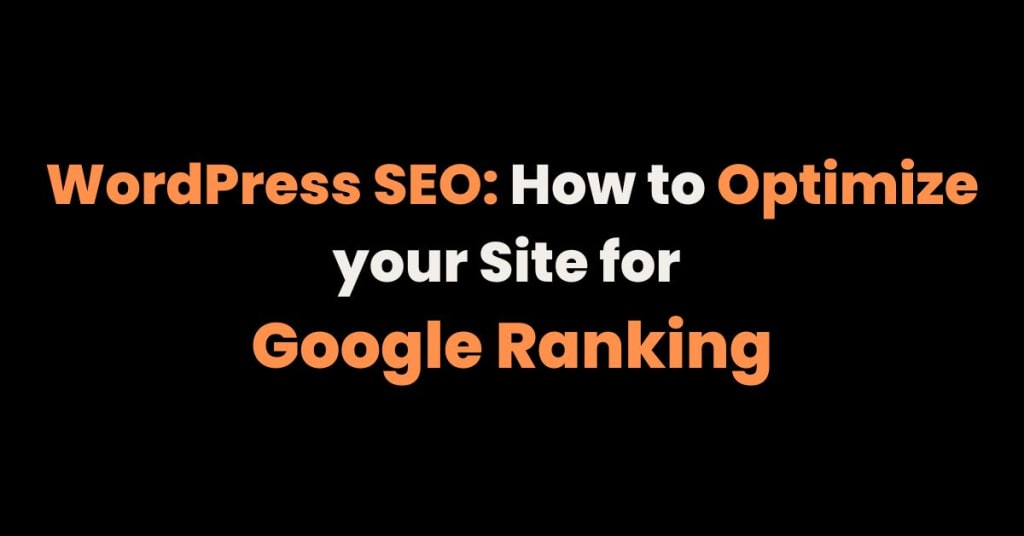WordPress SEO: How to Optimize your Site for Google Ranking
WordPress SEO

Are you a WordPress user that wants your site to rank higher in Google? If so, then you need to know about WordPress SEO. SEO is short for “search engine optimization” and it is the process of optimizing a website for Google ranking. There are many factors that go into SEO, but by following these simple tips, you can optimize your WordPress site for Google ranking.
The Benefits of SEO for WordPress.
As a WordPress user, you know that SEO is important for getting your site seen by potential visitors. However, you may not be aware of all the benefits that WordPress SEO can provide. Here are just a few of the ways that optimizing your WordPress site can help you:
- Improve your visibility in search engines: By ensuring that your site is properly optimized for search engines, you can improve your chances of appearing in search results when people are looking for information related to your business or website.
- Attract more visitors: Once your site starts appearing higher in search engine results pages (SERPs), you’ll begin to see an increase in the number of visitors coming to your site. This can lead to more customers or clients, and ultimately more business for you.
On-Page SEO Factors.
There are many on-page SEO factors that can affect your website's ranking. Here are 4 of the most important ones:
- Title tags - The title tag is one of the most important on-page SEO factors. Make sure to include your keyword in the title and keep it under 60 characters.
- Meta descriptions - A well-written meta description can improve your click-through rate and help you rank higher in the SERPs. Keep your meta descriptions under 160 characters and include your keyword.
- H1 tags - The H1 tag is another important on-page SEO factor. Use your keyword in the H1 tag and make sure it's placed strategically on the page.
- Alt text - Don't forget to add alt text to all of your images.
Off-Page SEO Factors
- The quality of your website's content: Make sure that your website's content is high-quality and relevant to your target audience. This will help your website to rank higher in search engine results pages (SERPs).
- The number of backlinks to your website: The more backlinks you have from high-quality websites, the better. This shows search engines that your website is popular and trustworthy.
- Social media engagement: If you're active on social media and have a lot of followers, this can help your website to rank higher in SERPs. Make sure you're posting interesting and engaging content that will get people talking about your brand.
Technical SEO Factors.
SEO is an important part of any online marketing strategy. Technical SEO is a process that helps improve the visibility and ranking of a website in search engine results pages (SERPs). There are many factors that contribute to technical SEO, including site structure, content, server configuration, and user experience.
Site structure is one of the most important technical SEO factors. A well-structured website is easy for search engines to crawl and index. It also provides a better user experience, which can lead to higher rankings. Content is another important factor.
High-quality, keyword-rich content helps improve a website's visibility and ranking. Server configuration can also impact SEO. A properly configured server can help improve website speed, which is a major ranking factor. Finally, user experience is important for both visitors and search engines.
Tips and tricks for further optimizing your site.
If you're using WordPress for your website, you're likely already aware of how important SEO is. However, there are always ways to further optimize your site and improve your ranking in search engines. Here are a few tips and tricks to help you get the most out of your WordPress site from an SEO standpoint.
First, make sure that you're using the most recent version of WordPress. Updates usually include new features and security fixes that can help improve your site's performance and protect it from attacks.
Next, take advantage of all the available plugins. There are plugins for just about everything, including optimizing your website for specific keywords and improving your social media integration. Do some research and find the plugins that will work best for your particular needs.
Finally, don't forget to keep track of your progress.
Conclusion
In conclusion, following these steps will help optimize your site for Google ranking:
- Do your research and target the right keywords
- Use keyword-rich titles, tags, and descriptions
- Create fresh, original content
- Promote your website through social media and other channels
- Monitor your activity and analyze your visitors
By following these steps, you can improve your chances of ranking higher on Google and driving more traffic to your website.





Comments
There are no comments for this story
Be the first to respond and start the conversation.